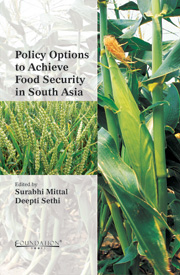Book contents
- Frontmatter
- Contents
- List of Contributors
- Foreword
- Acknowledgements
- List of Abbreviations
- 1 Food Security in South Asia
- 2 Food Security in India: Policies and Options
- 3 Multiple Facets of Food (In) Security in Sri Lanka: An Input to Food Policy
- 4 Food Security in Bangladesh: Achievements, Challenges and Way Forward
- 5 State of Agriculture and Food Security in Pakistan
- 6 Food Security Situation in Nepal: Issues and Suggested Policy Measures
- 7 Food Security in Maldives
- 8 Role of Regional Trade and Rural Development for Food Security in Bhutan
- 9 Food Security in Afghanistan
7 - Food Security in Maldives
Published online by Cambridge University Press: 05 June 2012
- Frontmatter
- Contents
- List of Contributors
- Foreword
- Acknowledgements
- List of Abbreviations
- 1 Food Security in South Asia
- 2 Food Security in India: Policies and Options
- 3 Multiple Facets of Food (In) Security in Sri Lanka: An Input to Food Policy
- 4 Food Security in Bangladesh: Achievements, Challenges and Way Forward
- 5 State of Agriculture and Food Security in Pakistan
- 6 Food Security Situation in Nepal: Issues and Suggested Policy Measures
- 7 Food Security in Maldives
- 8 Role of Regional Trade and Rural Development for Food Security in Bhutan
- 9 Food Security in Afghanistan
Summary
Introduction
The Republic of Maldives is a coral archipelago consisting of 26 atolls and is endowed with 1190 small tropical islands that cross strategic shipping routes and has marine environment rich in diversity. The coral reefs are the seventh largest in the world with a coverage of 8920 square kilometres, 198 islands of which are inhabited. Maldives is also the smallest country in South Asia in terms of both population and agricultural land area, with total area suitable for cultivation estimated at less than 30 sq. km. Almost 92 per cent of the area is covered by sea. In 1978, Maldives was among the world's poorest twenty countries with a population of 156,000. Today, it is inhabitant with the population of 300,000. It is on its way towards achieving middle-income status with a per capita gross domestic product approaching $ 2800 (World Bank, 2008). Not only this, Maldives has reached an impressive per capita income of US$ 3630 in 2008 from US$ 1830 in 1997 and sustained an annual average Gross Domestic Product (GDP) growth of 7.7 per cent in the 14 year period till 2008. United Nations Development Programme (UNDP) has categorised Maldives as the least developed country.
Maldives Vision 2020 aims at becoming one of the top ranking developing nations by the year 2020, through its rapid social and economic development. It has made a remarkable recovery from the tsunami, which inflicted damages of about $ 375 million, excluding $ 100 million in damages to resorts, the bulk of which were covered by private insurance.
- Type
- Chapter
- Information
- Policy Options to Achieve Food Security in South Asia , pp. 161 - 181Publisher: Foundation BooksPrint publication year: 2011



